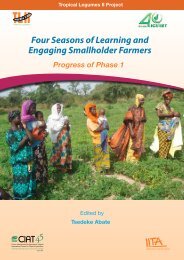Download - icrisat
Download - icrisat
Download - icrisat
Create successful ePaper yourself
Turn your PDF publications into a flip-book with our unique Google optimized e-Paper software.
42<br />
A few days ago, the Department of Agriculture (DA) signed a biofuels agreement with Praj Industries ‘to help<br />
develop the country’s biofuels industry’ during the state visit of President Gloria Macapagal-Arroyo (PNA,<br />
tradingmarkets.com). On behalf of the DA, Undersecretary Bernadette Romulo Puyat signed for the Philippines;<br />
Shashank Inamdar, Managing Director and CEO of Praj, signed for the company. Praj will ‘provide the design,<br />
engineering and supply the biofuel production plants to potential investors.’ The DA will in turn identify the land for<br />
growing the crop and encourage the farmers to grow sweet sorghum, sugarcane, cassava, jatropha, wheat,<br />
tapioca, sugar beet, among others. Praj already has a plant that will be producing ethanol in Ormoc, Leyte by<br />
March 2008.<br />
The DA is now identifying more than 400,000 hectares of land for private sector investments, of which about<br />
90,000 ha are in North Luzon, 10,000 ha in Central Philippines, and 300,000 ha in Mindanao. Investors can<br />
choose from these arrangements: straight purchase, lease, contract growing, joint venture. Agriculture Secretary<br />
Arthur Yap expects that the growing of biofuel crops for clean fuels will not only energize vehicles but, first of all,<br />
Philippine farms – the small farmers will benefit immensely from their harvests and the country will enjoy more<br />
and more independence from imported fossil fuels. If everything goes as expected, incomes of farmers will be<br />
guaranteed, more jobs will be created, and the local as well as national economy will perk up, animated, multiplying<br />
the effects on everyone. How is that possible? Agriculture is crucial in<br />
the country’s economy because it accounts for 25% of the gross<br />
In the Philippines, Mariano<br />
Marcos State University (MMSU)<br />
is the ICRISAT pilot site for<br />
sweet sorghum. In the village<br />
of Bungon in Batac, Ilocos<br />
Norte, there is a sweet<br />
sorghum cane mill and they<br />
are producing ethanol,<br />
vinegar, jaggery, syrup,<br />
cookies, popgrain.<br />
domestic product (GNP) and 35% of the labor force, according to Yap<br />
(Amy Remo, newsinfo.inquirer.net).<br />
Now, which crop for biofuel?<br />
Senator Migz Zubiri is for bioethanol from sugarcane. Earlier, he<br />
said: ‘The Philippines would need at least 10 bioethanol plants by<br />
2009’ (Carla Gomez, newsinfo.inquirer.net). That would be to meet<br />
the E-5 (5% ethanol-90% gasoline blend) requirement following the<br />
Biofuels Act. Zubiri is the Father of Biofuels in the Philippines. Signed<br />
by President Arroyo early January (Maricel Cruz, manilatimes.net),<br />
the Act took effect May 7 (planetark.org). Zubiri is one of the top<br />
sugar producers in the country (alternat1ve.com). So, sugarcane is<br />
the sugarcane farmer’s choice. To each his own.<br />
The DA’s choice is appropriate: the investor’s choice considering the<br />
farmer’s choice. They have to have the same crop choice if they are to work together. Not to each his own as has<br />
been the case for centuries.<br />
But if I were the farmer, sweet sorghum is the fuel of the future for me. Based on information from the International<br />
Crops Research Institute for the Semi-Arid Tropics (ICRISAT), sweet sorghum can grow with too much or too little<br />
moisture in the soil. Sounds too good to be true. I must see this with my own eyes.<br />
Biofuel Islands

















